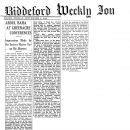Main menu
- ‘Abdu’l-Bahá’s Journey
- World Peace
- Stopping Racism in America
- Empowerment of Women
- More Principles...
- Prayer for America
‘Abdu’l-Bahá at Greenacre Conferences
Impressions Made by the Eastern Master Upon His Hearers.
The week of August 19 was the really important week at Greenacre this season, for the great Persian leader, ‘Abdu’l-Bahá, who has been visiting all the important cities in this country this summer, was there all the week, speaking every day, and giving private interviews to many people in addition. The principles for which ‘Abdu’l-Bahá stands, “peace and unity,” have always been the principles of Greenacre; the white “peace” flag has always greeted all who approach the place. Here have come, in years past, great teachers of all faiths and from all parts of the world, but perhaps none of as wide-spread interest as this latest foreign guest, whom his followers, the Bahá’í, call the master. Gatherings of Bahá’í have been held at Greenacre regularly each week, for many seasons, and when it was known that their leader was to come to this country to attend a great peace convention it was understood that he would pass some time with his friends there.
Picture a tall, commanding figure, with white hair and beard, eyes that, though blue, give the impression of dark eyes, so deep and keen are they, with a haunting something in their depths; a long black robe, and white fez; a firm, fine hand; this is the outward appearance of the master. His personality impresses those who meet him in various ways, according to their own temperaments; but all feel the power of the man. He is always ready to give his time to people who wish to meet him, even planning an audience for the colored servants at the Inn. When they were assembled before him, he addressed them somewhat as follows, the report is from memory: “Friends, I have asked to see you that I may talk to you of your relations to your fellowmen and to God. Though your skins are black and you are different from the people around you, your souls are not different; they may be as white as any man’s. I beg you to pray to God that you may be honest and truthful, that you may do your work well, that you may be faithful, and may live so that your souls may be close to God. I myself will supplicate God for you that you may be good and true. I had a servant once, black like you, but no man had ever a soul more white. I thank you all for your kindness to me; you have worked hard to prepare pleasant food for me; you have labored for my comfort, while I have been at ease. I thank you, and I will supplicate God for you, that he may help you.”
‘Abdu’l-Bahá speaks always through an interpreter; three young Persians are with him in that capacity.
While many know of the Bahá’í movement, and are more or less interested in it, and its great influence for good in Mohammedan countries, a few facts concerning its leader may be interesting. In 1844 a young Persian, Ali Mohammed, declared himself the Imam Mahdi, preached and taught till the government, fearful of an uprising, began a persecution, and in 1850 he was shot; he was called the Báb, his followers Bábists. One of his followers, a young nobleman, Mirza Hosein Ali, banished with others to Bagdad, later became the leader of the sect, and was called Bahá’ullah, the Glory of God. After his death, his eldest son, Abbas Effendi, who was born in 1844, the year the movement began, became his successor, in fulfillment of the wish of his father; he was then called ‘Abdu’l-Bahá, servant of God. For many years he was imprisoned at Akka, in Syria, but was set at liberty with the rise of the Young Turk movement, in 1908. Since that time he has traveled quite extensively, visiting England and France in 1911, and spending some months of this year in this country. He is to return in November. While in London, among Englishmen of importance who had interviews with him, was Rev. K.J. Campbell. He calls ‘Abdu’l-Bahá the “leader of one of the most remarkable religious movements of this or any age, a movement which includes, I understand, three million souls.”
‘Abdu’l-Bahá assured an English interviewer that he had no desire to found another sect. He does not wish to be called a prophet. “I am simply a servant of God,” he said, “and I do not wish to be called anything more than that.” He gives as the Bahá’í principle, “Live the life.” His message to people of all religions is to live perfectly their own religion; if the seeker is a Christian, he tells him to follow the teachings of the Bible literally; the Jew is told to return to his Scriptural faith; the Mohammedan to the principles of the Koran. He tries to teach the fuller revelation which unites all faith into one belief in God. His teaching is peace and unity.
Greenacre has offered many other interesting men and subjects this summer. Earlier in the season programmes for a week or more have been given here Recently Dr. H.E. Peckham of Boston has given a series of lectures on “The Eternal Quest”; Zueblin and Horatio Dresser have lectured; R.C. Douglas has given some mystical interpretations of Genesis, Dr. Schiermerhorn has spoken, Walter Hampden of New York has given readings, and there have been fine concerts, among them, as may be remembered, a piano recital of Professor Clarke of Biddeford. The Browning centenary was celebrated last week by Miss Abbie Fairfield of this city, who gave the paper which was given here in May. Five ladies from Biddeford and Saco recently passed a very pleasant day there, and all were granted an interview with ‘Abdu’l-Bahá.









